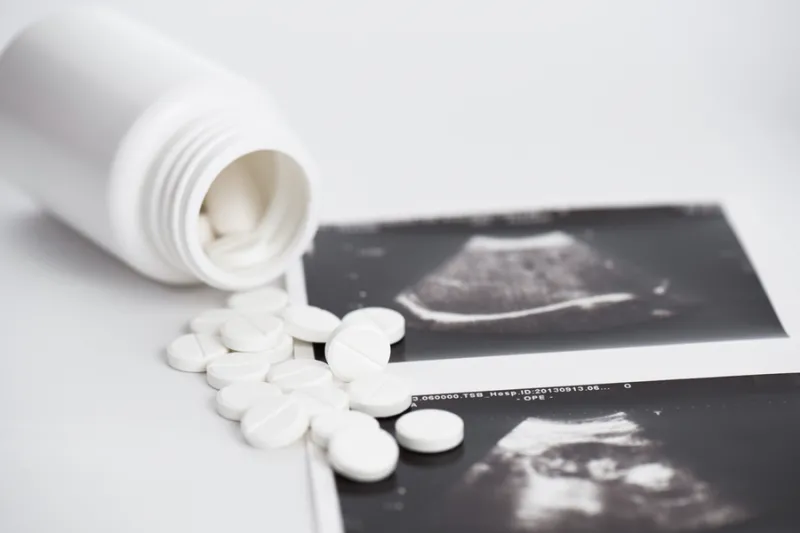
Washington, D.C. Newsroom, Dec 16, 2021 / 15:42 pm (CNA).
The Food and Drug Administration (FDA) lifted restrictions on mifepristone, a drug approved for use in medical abortions, on Thursday.
The decision authorizes doctors to prescribe the drugs online and mail the pills, allowing women to perform early abortions — up to ten weeks of gestation — without leaving their homes. The FDA first approved mifepristone, which is paired with another drug called misoprostol, for earlier abortions in 2000.
The FDA announced two changes: “Removing the requirement that mifepristone be dispensed only in certain healthcare settings, specifically clinics, medical offices, and hospitals” also known as the “in-person dispensing requirement,” and “adding a requirement that pharmacies that dispense the drug be certified.”
Taken by pill, this type of abortion is also referred to as abortion with pills, chemical abortion, medication abortion, and telemedicine abortion.
Abortion supporters have pointed to medical abortions as a kind of workaround or backup plan for women to access abortion as states restrict abortion and the U.S. Supreme Court considers a challenge to Roe v. Wade, the 1973 decision that legalized abortion nationwide. Pro-life groups stress that this type of abortion is not safe — neither for the woman nor for her unborn child.
According to the U.S. Centers for Disease Control’s most recent Abortion Surveillance report, for the year 2019, “early medical abortions” made up 42.3% of abortions that year.
The Guttmacher Institute, a reproductive research organization once associated with Planned Parenthood, documents state law regarding medical abortion. The pro-abortion group finds that 32 states requires physicians to administer medical abortion, 2 states ban medical abortion past a certain number of weeks, and 19 states say that the clinician must be physically present when the pills are administered.
The FDA placed mifepristone under REMS, or a “Risk Evaluation and Mitigation Strategies” system, to “mitigate the risk of serious complications associated with mifepristone.” Thursday’s modification came after a review of the REMS program.
The FDA “determined that the data support modification of the REMS to reduce burden on patient access and the health care delivery system and to ensure the benefits of the product outweigh the risks,” the FDA’s website reads.
The FDA’s decision comes after a back-and-forth fight in the courts.
Last year, a federal district court blocked the FDA from enforcing its requirement that women seeking abortions must receive mifepristone in person rather than by mail. The successful lawsuit, filed by the American Civil Liberties Union (ACLU), argued that women risked unnecessary exposure to Covid-19 by picking up the pill in person when they are already permitted to swallow it at home.
In January, under the Trump administration, the Supreme Court granted the FDA’s request to restore the requirement. Three months later, under the Biden administration, the FDA announced a lifting of the rule again during the pandemic, citing the drug’s safety and Covid-related risks posed going into a clinic office.
Pro-life concerns
Lila Rose, the president of pro-life group Live Action, called Thursday’s decision “horrific,” while the March for Life predicted that it will “lead to more lives lost to abortion and will increase the number of mothers who suffer physical and psychological harm from chemical abortions.”
The Susan B. Anthony List also condemned the FDA’s decision, under the Biden administration.
“The Biden administration’s reckless move puts countless women and unborn children in danger,” SBA List State Policy Director Sue Liebel said. “Abortion activists’ longtime wish has been to turn every post office and pharmacy into an abortion center. They promote abortion drugs as easy, painless and private. Science says otherwise.”
In anticipation of the FDA’s decision, Charlotte Lozier Institute (CLI), the research arm of the Susan B. Anthony List, released a new study finding increased access to abortion pills a public health risk in November.
“The rate of abortion-related emergency room visits following a chemical abortion increased over 500% from 2002 through 2015, according to an analysis of Medicaid claims data,” the press release read. “Over the same period, chemical abortions within the study population increased from 4.4% to 34.1% of total abortions.”
The study also found that the rate of abortion-related emergency-room visits is increasing faster for chemical abortions than for surgical abortions and that chemical abortion makes subsequent abortions more dangerous.
Students for Life of America President Kristan Hawkins also warned about medical abortions during a virtual news conference on Thursday.
“Today, we may very well be confronting a brand new frontier of abortion,” she said. “In essence, death by mail, delivered to your doorstep.”
What is a ‘medical abortion’?
An obstetrician-gynecologist who once performed more than 1,200 abortions partnered with pro-life group Live Action in 2016 to describe various abortion procedures. In a video, Dr. Anthony Levatino named the “two steps” of a medical or chemical abortion that is administered up to 10 weeks in pregnancy.
First, “the woman takes pills which contain mifepristone,” or RU-486, he began. This blocks the hormone progesterone and causes the “lining of the mother’s uterus” to break down, “cutting off blood and nourishment to the baby.”
Twenty-four to 48 hours later, the woman takes misoprostol or Cytotec. Together, he continued, these drugs “cause severe cramping, contractions, and often heavy bleeding to force the dead baby out of the woman’s uterus.”
“The process can be very intense and painful,” he cautioned, “and the bleeding and contractions can last for a few hours to several days.” Frequently, he said, the woman will “sit on a toilet as she prepares to expel the child which she will then flush.”
If you value the news and views Catholic World Report provides, please consider donating to support our efforts. Your contribution will help us continue to make CWR available to all readers worldwide for free, without a subscription. Thank you for your generosity!
Click here for more information on donating to CWR. Click here to sign up for our newsletter.





Thanks for giving such an interesting blog. This was quite helpful in understanding the basics of medical abortion.